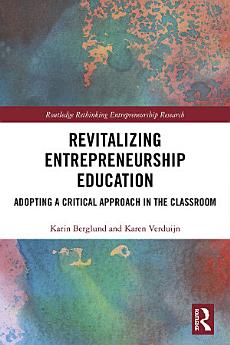Revitalizing Entrepreneurship Education: Adopting a critical approach in the classroom
អំពីសៀវភៅអេឡិចត្រូនិកនេះ
Students of entrepreneurship need to understand why and how entrepreneurship is seen as a moral force which can solve social problems or protect the environment, or even to tackle political problems. It is time to evaluate how such contributions and insights have entered our classrooms. How much – if any – critical discussion and insight enters our classrooms? How do we change when students demand to be taught "how to do it", not to be critical or reflexive?
If educators are to bring alternative perspectives into the classroom, it will entail a new way of thinking. There is a need to share ideas and practical approaches, and that is what the contributions to this volume aim to do and to illuminate new ways forward in entrepreneurship education.
អំពីអ្នកនិពន្ធ
Karin Berglund is Associate Professor at Stockholm Business School and Centre Director for the Stockholm School of Entrepreneurship (SSES) at Stockholm University. In her research, she has focused on how entrepreneurship has been manifested in different forms in contemporary society. In this work she has highlighted individuals other than the Western male hero stereotype entrepreneur, and has drawn attention to processes other than those resulting in the establishment of new enterprises. She uses her (mainly) ethnographic studies to contribute to critical management, organisation and entrepreneurship studies. She has published in international journals covering different topics related to entrepreneurship, e.g. Action Research, Entrepreneurship and Regional Development, Ephemera, International Entrepreneurship and Management Journal, Journal of Enterprising Communities, Social Entrepreneurship Journal, Scandinavian Journal of Management.
Karen Verduyn is a senior lecturer at the Faculty of Economics and Business Administration of VU University Amsterdam, and programme director of the Amsterdam (joint) MSc in Entrepreneurship. Her research projects revolve around understanding the complexities of entrepreneurial everyday life. She has published in such journals as the International Review of Entrepreneurship, the Journal of Enterprising Communities, Entrepreneurship and Regional Development, the International Journal of Entrepreneurial Behaviour & Research, the International Small Business Journal, and Organization. She is a board member of the Entrepreneurship Studies Network (special interest group of the Institute for Small Business and Entrepreneurship), and the International Journal of Entrepreneurship and Small Business.




